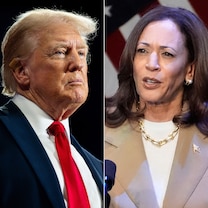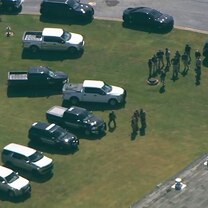Former 2016 Trump campaign adviser is charged over his work for sanctioned Russian TV
The U.S. government has charged a Russian-born U.S. citizen and former adviser to Donald Trump’s 2016 presidential campaign with working for a sanctioned Russian state television network and laundering the proceeds
WASHINGTON -- The Justice Department has charged a Russian-born U.S. citizen and former adviser to Donald Trump's 2016 presidential campaign with working for a sanctioned Russian state television network and laundering the proceeds.
Indictments announced Thursday allege that Dimitri Simes and his wife received over $1 million dollars and a personal car and driver in exchange for work they did for Russia's Channel One since June 2022. The network was sanctioned by the U.S. in 2022 over Russia's invasion of Ukraine.
Simes, 76, and his wife, Anastasia Simes, have a home in Virginia and are believed to be in Russia.
“These defendants allegedly violated sanctions that were put in place in response to Russia’s illegal aggression in Ukraine,” U.S. Attorney Matthew M. Graves said in a statement announcing the charges. “Such violations harm our national security interests — a fact that Dimitri Simes, with the deep experience he gained in national affairs after fleeing the Soviet Union and becoming a U.S. citizen, should have uniquely appreciated.”
The indictments come at a time of renewed concern about Russian efforts to meddle with the upcoming U.S. election using online disinformation and propaganda. On Wednesday federal authorities announced charges against two employees of the Russian media organization RT accused of covertly funding a Tennessee company that produced pro-Russian content.
Simes and the Washington think tank he led, the Center for the National Interest, figured prominently in special counsel Robert Mueller’s investigation into Russian interference in the 2016 presidential election and potential ties to the Trump campaign.
The report chronicles interactions that the Soviet-born Simes, who immigrated to the U.S. in the 1970s, had with assorted figures in Trump's orbit, including Trump's son-in-law Jared Kushner.
Before one such meeting, according to the Mueller report, Simes sent Kushner a letter detailing potential talking points for Trump about Russia and also passed along derogatory information about Bill Clinton that was then forwarded to other representatives of the campaign.
Simes’s think tank, which was founded by former President Richard Nixon, helped arrange a foreign policy speech at the Mayflower Hotel in Washington at which Simes introduced Trump, according to the report. Among those present was Sergei Kislyak, then the Russian ambassador to the U.S.
Simes was never charged with any crime in relation to the investigation.
After the report was released, Simes defended himself in an interview in The Washington Post: "I did not see anything in the Mueller report that in any way that would indicate any questionable activity on my part or on the center’s part.”
A second indictment alleges that Anastasia Simes, 55, received funds from sanctioned Russian businessman Alexander Udodov. Udodov was sanctioned last year for his support for the Russian government. He is the former brother-in-law of Russian Prime Minister Mikhail Mishustin and has been linked to business dealings with both of them. Udodov also has been investigated for money laundering.
It was not immediately clear if either defendant had a lawyer who could speak on their behalf. An attorney who previously represented Simes said he was no longer representing him. The Trump campaign did not immediately return a message seeking comment Thursday.
In an interview with The New York Times before the charges were announced, Simes, who appears regularly on Channel One, defended the work he was doing.
“I assumed that what I was saying on Russian TV would not be to the liking of the Biden administration, but I also assumed that as long as it was just my opinion and was presented as such, it was not something for which I could be prosecuted,” he told the newspaper.




